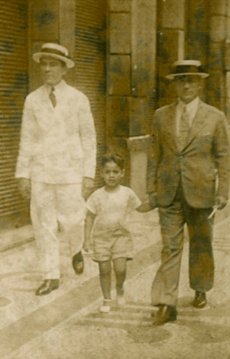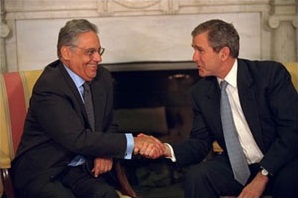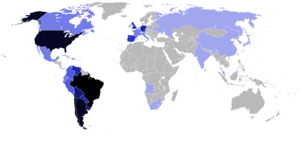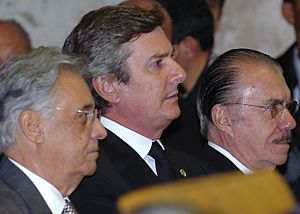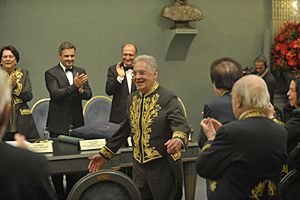Fernando Henrique Cardoso facts for kids
Quick facts for kids
Fernando Henrique Cardoso
|
|
|---|---|
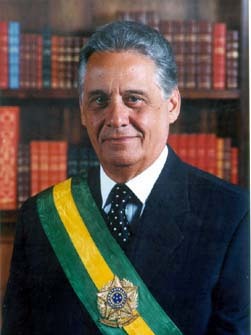
Official portrait, 1999
|
|
| President of Brazil | |
| In office 1 January 1995 – 31 December 2002 |
|
| Vice President | Marco Maciel |
| Preceded by | Itamar Franco |
| Succeeded by | Luiz Inácio Lula da Silva |
| Minister of Finance | |
| In office 19 May 1993 – 30 March 1994 |
|
| President | Itamar Franco |
| Preceded by | Eliseu Resende |
| Succeeded by | Rubens Ricupero |
| Minister of Foreign Affairs | |
| In office 2 October 1992 – 20 May 1993 |
|
| President | Itamar Franco |
| Preceded by | Celso Lafer |
| Succeeded by | Celso Amorim |
| Senator for São Paulo | |
| In office 15 March 1983 – 5 October 1992 |
|
| Preceded by | Franco Montoro |
| Succeeded by | Eva Alterman Blay |
| Chair of the Brazilian Centre of Analysis and Planning | |
| In office 1980–1983 |
|
| Preceded by | Cândido Procópio Ferreira |
| Succeeded by | José Arthur Giannotti |
| Personal details | |
| Born | 18 June 1931 Rio de Janeiro, Federal District, Brazil |
| Political party | PSDB (1988–present) |
| Other political affiliations |
PMDB (1980–1988) MDB (1974–1980) |
| Spouses | |
| Children | 3 |
| Relatives | Pedro Cardoso (cousin) |
| Residences | São Paulo, São Paulo, Brazil |
| Alma mater | University of São Paulo (PhD) |
| Profession | Sociologist |
| Signature |  |
| Website | http://www.ifhc.org.br/ |
Fernando Henrique Cardoso GCB GCTE GCoIISE GColIH GColL GCM RE DMN CYC OMRI (Portuguese: [feʁˈnɐ̃du ẽˈʁiki kaʁˈdozu]; born 18 June 1931), also known by his initials FHC (Portuguese: [ɛfjaɡaˈse]), is a Brazilian sociologist, professor, and politician who served as the 34th president of Brazil from 1 January 1995 to 31 December 2002. He was the first Brazilian president to be reelected for a subsequent term. An accomplished scholar of dependency theory noted for his research on slavery and political theory, Cardoso has earned many honors including the Prince of Asturias Award for International Cooperation (2000) and the Kluge Prize from the US Library of Congress (2012).
Cardoso was the 10th president of the International Sociological Association (1982–1986).
Contents
Personal and professional life
Cardoso descends from wealthy Portuguese immigrants. Some were politicians during the Empire of Brazil. He also has African ancestry, through a black great-great-grandmother and a mulatto great-grandmother. Cardoso described himself as "slightly mulatto" and allegedly said he has "a foot in the kitchen" (a nod to historical Brazilian domestic slavery).
Born in Rio de Janeiro, he lived in São Paulo for most of his life. Cardoso is a widower who was married to Ruth Vilaça Correia Leite Cardoso, an anthropologist, from 1953 until her death on 24 June 2008; they had three children. Educated as a sociologist, he was a professor of political science and sociology at the Universidade de São Paulo. and president of the International Sociological Association (ISA), from 1982 to 1986. He is a member of the Institute for Advanced Study (Princeton), an honorary foreign member of the American Academy of Arts and Sciences and has written several books.
Cardoso was also associate director of Studies in the École des hautes études en sciences sociales in Paris, then visiting professor at the Collège de France and later Paris Nanterre University. He later gave lectures at British and US universities including Cambridge University, Stanford University, Brown University and the University of California, Berkeley. He is fluent in Portuguese, English, French, and Spanish, and can express himself in Italian and German.
After his presidency, he was appointed to a five-year term (2003–2008) as professor-at-large at Brown University's Watson Institute for International Studies, where he is now on the board of overseers. Cardoso is a founding member of the University of Southern California Center on Public Diplomacy's advisory board. In February 2005, he gave the fourth annual Kissinger Lecture on Foreign Policy and International Relations at the Library of Congress, Washington DC on "Dependency and Development in Latin America.
In 2005, Cardoso was selected by the British magazine Prospect as being one of the world's top one hundred living public intellectuals.
Academic career
Cardoso earned a bachelor's degree in Social Sciences from Universidade de São Paulo in 1952, from where he also earned a Master's and a Doctorate in Sociology. His doctoral thesis, under the supervision of Florestan Fernandes, examined the institution of slavery in Southern Brazil, critiquing, from a Marxist perspective, the dominant approach of Gilberto Freyre to the topic. It has since become a classic on the subject. Cardoso has also received the Livre-Docência degree in 1963, the most senior level of academic recognition in Brazil, also from Universidade de São Paulo. In 1968, he received the title of Cathedratic Professor, holding the chair of Political Science at Universidade de São Paulo.
As he continued his academic career abroad in Chile and France after the tightening of Brazilian military dictatorship, Cardoso published several books and papers on state bureaucracy, industrial elites and, particularly, dependency theory. His work on dependency would be his most acclaimed contribution to sociology and development studies, especially in the United States. After presiding the International Sociological Association from 1982 to 1986 Cardoso was selected as a Fulbright Program 40th anniversary distinguished fellow and in that capacity was a visiting scholar and lectured at Columbia University on democracy in Brazil. Cardoso currently gives speeches and classes abroad. In June 2013 he was elected as a member of Academia Brasileira de Letras. He said his election was due to recognition for his academic achievements, rather than his political career.
Elections
After his return to Brazil, Fernando Henrique engaged with the burgeoning democratic opposition to the military-dominated regime both as an intellectual and as a political activist. He became Senator from São Paulo for the former Brazilian Democratic Movement (MDB) in 1982, replacing Franco Montoro, the newly elected governor of São Paulo. In 1985, he ran unsuccessfully for mayor of São Paulo against former President Jânio Quadros. Ahead in the polls, he let himself be photographed in the mayor's chair before the elections. Some attribute his loss to this episode.
Elected to the Senate in 1986 for the Party of the Brazilian Democratic Movement (PMDB), which MDB became after re-democratization, he joined a group of PMDB parliamentarians who left that party to found the Brazilian Social Democratic Party (PSDB) after previously held PMDB positions shifted to the right when the party filled with politicians who had collaborated with the dictatorship. As senator, Cardoso took part in the 1987–1988 National Constituent Assembly that drafted and approved Brazil's current Constitution in the wake of the country's re-democratization. In the early stages of the Constituent Assembly's work (from February to March 1987), Cardoso led the committee that drafted the internal rules of procedure, including the procedural rules governing the drafting of the Constitution itself. These rules of procedure were adopted by the Assembly and published on 25 March 1987. Until 1992, Cardoso served as Leader of the PSDB in the Senate. From October 1992 to May 1993, he served as Minister of Foreign Affairs under President Itamar Franco (PMDB).
From May 1993 to April 1994, he was Minister of Finance and resigned in April 1994 to launch a presidential campaign. In the 3 October election, he won the presidency in the first round of voting with 54% of the vote, more than twice that of his nearest opponent, Luiz Inácio Lula da Silva. This is still the largest margin of victory ever recorded in a free election in Brazilian history. After the constitution was amended to allow a president to succeed himself, he won a second term almost as easily in 1998, taking 53% to Lula's 31.7% to win in a single round. To date, he is the only president to win an outright majority of the popular vote, and the only one to win the presidency in a single round since the institution of the two-round system in 1989.
Cardoso was succeeded in 2003 by Lula da Silva, who ran for the fourth time and had come in second on prior attempts. Lula won in the runoff election against the Cardoso-supported candidate, José Serra. Lula's election has been interpreted as resulting from Cardoso's low approval ratings in his second term.
Presidency (1995–2003)
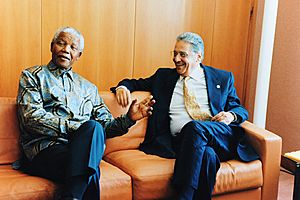
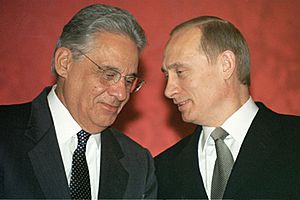
Cardoso, often nicknamed "FHC", was elected with the support of a heterodox alliance of his own Brazilian Social Democracy Party (PSDB) and two right-wing parties, the Liberal Front Party (PFL) and the Brazilian Labour Party (PTB). Brazil's largest party, the centrist Party of the Brazilian Democratic Movement (PMDB), joined Cardoso's governing coalition after the election, as did the right-wing Brazilian Progressive Party (PPB) in 1996.
Party loyalty was not always strong, and coalition members did not always vote with the government. Cardoso had difficulty at times gaining support for some of his legislative priorities, even though his coalition held an overwhelming majority of the congressional seats. Nevertheless, many constitutional amendments were passed during his presidency.
Cardoso's presidency saw institutional advancements in human rights, beginning with a national secretariat and a new government program, discussed with the civil society, to address the issue. On 8 January 1996, he issued the controversial Decree 1775, which created a framework for the clear demarcation of indigenous territories, but which, as part of the process, opened indigenous territories to counterclaims by adjacent landowners. In 2000, Cardoso demanded the disclosure of some classified military files concerning Operation Condor, a network of South American military dictatorships that kidnapped and assassinated political opponents.
FHC was the first Brazilian President to address the inequality and the enormous gap between rich and poor. He started the following programs: Bolsa Escola, the Auxílio Gás, the Bolsa Alimentação, and the Cartão Alimentação.
His wife, Ruth Cardoso, focused on unifying transfer programs aimed at helping people suffering from poverty and hunger., by means of a program based on the idea that educating the poor could help raise them out of poverty.
Cardoso's administration deepened the privatization program launched by president Fernando Collor de Mello. During his first term, several government-owned enterprises in areas such as steel milling, telecommunications and mining, such as Telebras and Companhia Vale do Rio Doce were sold to the private sector, the deepest denationalisation in Brazilian history, amidst a polarized political debate between "neoliberals" and "developmentalists". Ironically, this time Cardoso was against the latter group, generating uproar among former academic colleagues and political allies who accused him of reneging his previous intellectual work. Economists still contend over its long-term effects; some research suggests that companies sold by the government achieved better profitability as a result of their disengagement from the state.
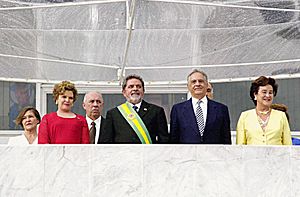
Despite the sale of public assets, the years 1995 to 2002 saw a rise of the total public debt from 30% to 55.5% of GDP. Economists aligned with his government argued that this was due to external factors outside the control of the administration at the time, such as the devaluation of the Brazilian real and the growth of the share of the debt denominated in US dollars. Nevertheless, devaluation of the currency was an instrument of monetary policy used right after his reelection, when the real pegged to the dollar led to a financial crisis that saw the country lose much of its foreign reserve fund and raise its interest rates on government bonds to very high levels as he tried to stabilize the currency under a new free-floating regime. With this economic shift, the greatest achievement of Cardoso – his landmark lowering of inflation – was maintained, but his popularity plummeted.
Given his previous experience as Minister of Foreign Affairs and his prestige as an internationally famous sociologist, he was respected on the world scene, building friendships with such leaders as Bill Clinton and Ernesto Zedillo. Although he was respected abroad, in Brazil he had problems gaining support in Congress for government priorities and among people in general. As a result, major reforms planned by the executive branch, such as changes in the tax system and to social security, were only partially approved and only after long discussion. Although claiming to still support social democracy, his economic policies led people on the left to identify him with neoliberalism and right-wing politics, terms that often carry a very negative connotation in Latin American political debate and academic circles.
He also experienced personal problems with former ally Itamar Franco, his predecessor and later became Governor of Minas Gerais, a fierce opponent of his administrative reforms that saw the state lose its capacity to contract debt and forced a reduction of local government spending. Cardoso was also criticized for amending the constitution to his own benefit, allowing him to stay eight years in office. His popularity in his first four years, gained with the success of Plano Real, decreased during his last four years as the currency crisis was followed by lower economic growth and employment rates, greater public debt, growing political dissent, low levels of investment in appropriate infrastructure, and, finally, an energy crisis caused by an unexpected drought, as over 80% of Brazil's electricity is hydroelectric. He publicly admitted that he could have done more for public security and for the creation of new jobs, but defended his policies in areas such as health and education.
Cardoso's administration was accused of bribing congressmen to pass a constitutional amendment that secured FHC the right to seek a reelection, which he eventually won.
Post-presidency
After stepping down from office, he assumed a position as a senior leader of his party and leading public voice in the opposition to the incumbent Workers' Party, writing extensively on Brazilian politics for newspapers and giving lectures and interviews. Nevertheless, his relatively low popularity rates among the general population have made his legacy a mixed blessing to his political allies, who are somewhat reluctant to embrace it wholeheartedly during elections, especially on topics regarding privatization and social policy. In 2006, he helped the campaign of the PSDB candidate for the Presidency, Geraldo Alckmin, and has reiterated that he does not wish to run for office again. In the 2022 presidential election, Cardoso endorsed his former Workers' Party rival Lula over then-incumbent Jair Bolsonaro.
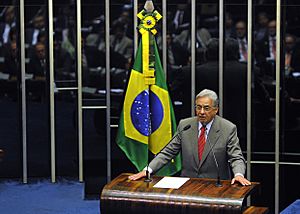
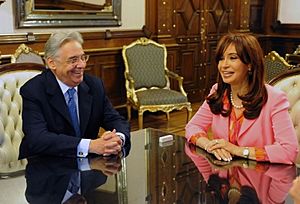
He dedicates his time to a personal institute which he founded in São Paulo, based on the model of bodies created by former presidents of the United States and has written two books about his experience as president of Brazil. He lectures at Brown University about Brazilian economic policy, urban development, and deforestation and has taught as a guest lecturer at Sciences Po in Paris. Also, in 2007 he became a member of the editorial board of the Latin American policy publication Americas Quarterly, for which he is an occasional contributor.
Since leaving the Brazilian presidency, Cardoso has been involved in a number of international organisations and initiatives. He is a member of the Club of Madrid and was its president from 2003 to 2006. He has been a member of the Fondation Chirac's honour committee, ever since the Foundation was launched in 2008 by former French president Jacques Chirac to promote world peace. Cardoso is a founding member of Washington D.C.-based think tank The Inter-American Dialogue as well as former chair of the organization's board. He is also a former director of World Resources Institute.
Cardoso is also a member of The Elders, a group of independent global leaders who work together on peace and human rights issues. In August 2009, he travelled to Israel and the West Bank as the head of an Elders delegation that also included Ela Bhatt, Gro Harlem Brundtland, Jimmy Carter, Mary Robinson and Desmond Tutu.
In 2013 he became a member of the Brazilian Academy of Letters.
In 2017, Cardoso received the Distinguished Lifetime Achievement Award from the Inter-American Dialogue.
Honours
Foreign honours
 Argentina: Collar of the Order of the Liberator General San Martín
Argentina: Collar of the Order of the Liberator General San Martín Bolivia: Collar of the Order of the Condor of the Andes
Bolivia: Collar of the Order of the Condor of the Andes Chile: Collar of the Order of Merit (Chile)
Chile: Collar of the Order of Merit (Chile) Colombia: Collar of the Order of Boyacá
Colombia: Collar of the Order of Boyacá Costa Rica: Gran Cross of the Order of Juan Mora Fernández
Costa Rica: Gran Cross of the Order of Juan Mora Fernández Denmark: Knight of the Order of the Elephant
Denmark: Knight of the Order of the Elephant Ecuador: Collar of the National Order of Merit (Ecuador)
Ecuador: Collar of the National Order of Merit (Ecuador) Finland: Gran Cross with Collar of the Order of the White Rose of Finland
Finland: Gran Cross with Collar of the Order of the White Rose of Finland France:
France:
- Gran Cross of the Legion of Honour
- Officier of the Ordre des Palmes académiques
 Germany: Grand Cross Special Class of the Order of Merit of the Federal Republic of Germany
Germany: Grand Cross Special Class of the Order of Merit of the Federal Republic of Germany Hungary: Grand Cross with Chain of the Hungarian Order of Merit
Hungary: Grand Cross with Chain of the Hungarian Order of Merit Italy: Collar of the Order of Merit of the Italian Republic (1995)
Italy: Collar of the Order of Merit of the Italian Republic (1995) Japan: Grand Cordon of the Order of the Chrysanthemum
Japan: Grand Cordon of the Order of the Chrysanthemum KSA: Collar of the Order of King Abdulaziz
KSA: Collar of the Order of King Abdulaziz Malaysia: Honorary Recipient of the Order of the Crown of the Realm (1995)
Malaysia: Honorary Recipient of the Order of the Crown of the Realm (1995) Mexico: Collar of the Order of the Aztec Eagle
Mexico: Collar of the Order of the Aztec Eagle Panama: Gran Cross of the Order of Manuel Amador Guerrero
Panama: Gran Cross of the Order of Manuel Amador Guerrero Paraguay: Gran Cross of the National Order of Merit (Paraguay)
Paraguay: Gran Cross of the National Order of Merit (Paraguay) Peru:
Peru:
- Grand Cross with diamonds of the Order of the Sun of Peru
- Gran Cross of the National Order of Merit
 Portugal:
Portugal:
- Collar of the Order of Prince Henry (2000)
- Collar of the Order of Liberty (1995)
- Grand Cross of the Order of Merit (1987)
- Collar of the Military Order of Saint James of the Sword (1997)
- Grand Cross of the Order of the Tower and Sword (2002)
 Poland:
Poland:
- Order of the White Eagle (2002)
- Grand Cross of the Order of Merit of the Republic of Poland (1995)
 Romania: Order of the Star of Romania
Romania: Order of the Star of Romania South Africa: Gran Cross of the Order of Good Hope
South Africa: Gran Cross of the Order of Good Hope South Korea: Grand Order of Mugunghwa
South Korea: Grand Order of Mugunghwa Spain: Collar of the Order of Isabella the Catholic (1998)
Spain: Collar of the Order of Isabella the Catholic (1998) Slovakia: Grand Cross (or 1st Class) of the Order of the White Double Cross (2001)
Slovakia: Grand Cross (or 1st Class) of the Order of the White Double Cross (2001) Suriname: Grand Cross of the Honorary Order of the Yellow Star
Suriname: Grand Cross of the Honorary Order of the Yellow Star Ukraine: First Class of the Order of Prince Yaroslav the Wise
Ukraine: First Class of the Order of Prince Yaroslav the Wise Uruguay: Medal of the Oriental Republic of Uruguay (1995)
Uruguay: Medal of the Oriental Republic of Uruguay (1995) United Kingdom: Honorary Knight Grand Cross of the Order of the Bath (1997)
United Kingdom: Honorary Knight Grand Cross of the Order of the Bath (1997) United States: Kluge Prize, 2012
United States: Kluge Prize, 2012 Venezuela:
Venezuela:
- Collar of the Order of the Liberator
- Gran Cross of the Order of Francisco de Miranda
Honorary doctorate
- 1978 Honorary Doctor of Laws, Rutgers University
- 2001 Honorary Doctor of Law, Hebrew University of Jerusalem, Israel (awarded in São Paulo on 11/18)
- 2012 Honorary Doctor of Sociology, ISCTE-IUL, Portugal
- 2016, Honorary Doctor of Laws, Harvard University (awarded in Cambridge, Massachusetts, on 26 May 2016).
Selected works
- Cardoso, Fernando Henrique (2006) The Accidental President of Brazil, PublicAffairs, ISBN: 1-58648-324-2
- Cardoso, Fernando Henrique (2001) Charting a New Course: The Politics of Globalization and Social Transformation, Rowman & Littlefield, ISBN: 0-7425-0893-5
- Goertzel, Ted G. (1999) Fernando Henrique Cardoso: Reinventing Democracy in Brazil, Boulder: Lynne Rienner.
- Cardoso, Fernando Henrique and Faletto, Enzo (1979) "Dependency and Development in Latin America", University of California Press, ISBN: 0-520-03193-8
See also
 In Spanish: Fernando Henrique Cardoso para niños
In Spanish: Fernando Henrique Cardoso para niños


